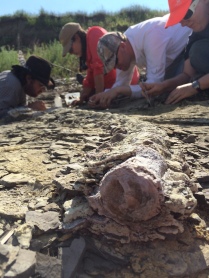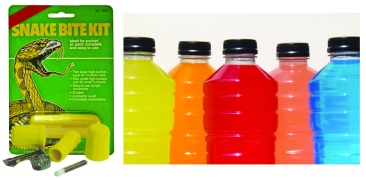The academic year begins anew, as do weekly entries to the Museum of Geology blog. We’ve been especially busy this summer with ongoing projects and activities, and we’ll outline some new developments in the coming weeks.

Many of us have spent more than a few days to weeks in the field over the past few months. Most of us view field work as a welcome and inspirational break from the rigors of the off-season. Those of us who undertake field education get the added bonus of working with energetic and passionate students.
The South Dakota School of Mines and the Museum of Geology has one of the most active field education programs in the country. We work to instill the essential values that field science is dependent on, experiential learning, observational skills, perseverance, and accurate documentation.
However, there are other equally important, but less emphasized qualities that are indispensable to success in a field setting, qualities that have less to do with scientific rigor and more to do with establishing and maintaining a productive working environment. These are:
Security– self-preservation in terms of safety and productivity
Cognizance– awareness of your surroundings and those around you
Industriousness– a constant state of productive activity
Selflessness– putting the needs of others or the group ahead of your own
Wonder– awe and inspiration in the beautiful, unexpected, or inexplicable
Over the next several weeks blog entries will be devoted to each of these attributes exemplifying their necessity in a field setting. While recognition of these qualities stems from working with field geologists and paleontologists, they are expected to be applicable across additional field disciplines.
Security entails maintaining protection from physical harm. Obviously, we’re all aware of the need for safe practices in the field. Anyone leading field activities hopefully devotes a significant portion of introductory material to recognition of hazards such as dehydration, exposure, exertion, wildlife, and weather.
Field work, for the most part, is not inherently dangerous, no more so than hiking, fishing, geocaching, or most other outdoor activities. The main issue with field work is that mitigation of accidents is much more challenging as the availability of supplies and expertise is typically limited. Proper field security routinely involves appropriate recognition of hazards and their associated risk.
Field orientation frequently places emphasis on the “romantic” or “spectacular” hazards, such as wildlife attacks, snake bites, or lightning strikes. While these events are dangerous, they are also exceedingly rare. Most field incidents result from mundane causes like automobile accidents, lack of water, airborne debris, falls, or minor injuries due to repetitive movements like walking or using a hammer.
Effective security involves vigilant attention to all hazards, especially those that are most likely to occur. Over twenty years ago I was given a snake bite kit as a gift to carry in my field pack. The iodine antiseptic expired before I ever used it. In that time I’ve gone through dozens of small first aid kits responding to minor injuries and issues. I’ve prescribed sports drinks for dehydration more times than I can remember, yet I’ve never dealt with a single wildlife attack or weather related injury. Effective security emphasizes realistic preparation and response rather than misguided focus on contingency plans for extreme scenarios.

Security is equally essential for productivity. Self preservation goes beyond cheating death and injury; self preservation insures that you remain a productive member of the crew. This involves pacing yourself throughout the day, eating properly, avoiding unnecessary risks or exertion, and getting appropriate rest during the evening. These facets of security will become crucial as you become a “veteran” field scientist who simply cannot physically compete with youthful counterparts, but must use your energy in a more efficient manner. Devotion to lifelong security will also ensure a long career not cut short by debilitating injury or deteriorating physical condition.
So, stay safe out there. Make sure you return to camp at night with all your fingers and toes. Make certain your colleagues do the same. For Pete’s sake, if you’re having trouble controlling your vehicle on unmaintained roads, slow down. Finally, ensure that you stay upbeat and productive throughout the entire field season, and your entire career.
